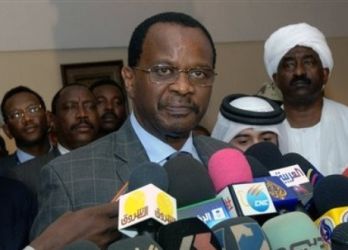Darfur’s Al-Sissi says he is ready to abandon post in favour of rebels
March 16, 2013 (KHARTOUM) – The chairman of Darfur Regional Authority (DRA) Dr Tijani Al-Sissi said he is ready to give up his post in favour of the Justice and Equality Movement (JEM) or Sudan Liberation Movement of Abdel-Wahid al-Nur (SLM-AW), provided that they embrace all factions without exclusion.

The DRA chief was on a visit to Cairo accompanied by the Sudanese minister of investments Mustafa Osman Ismail where they met Egyptian president Muhammad Morsi to invite his country to take part in the Darfur donors conference taking place next month in Qatar.
He set the four priorities of the regional authority as being voluntary return of more than 1.5 million displaced, including one million displaced people in refugee camps; implementation of reconstruction and development programs; repairing the social fabric which has been ruptured by the war and sustaining security in Darfur.
The DDPD was finalised at the All Darfur Stakeholders Conference in May 2011 in Doha. In mid-July the Sudanese government and the Liberation and Justice Movement (LJM) signed a protocol agreement committing themselves to the document.
The Sudan Liberation Movement of Minni Minnawi (SLM-MM), SLM-AW) and JEM refused to sign the accord and remain at war with Khartoum.
Al-Sissi said he is optimistic about the cooperation deal which was signed between Khartoum and Juba earlier this week and expressed hope about its positive impact on the situation in Darfur, explaining that South Sudan had constantly sought to fuel the crisis in Sudan’s western region in order to use it as a negotiating card.
He noted that the economic crisis in Sudan led to a delay in fulfilling the government’s commitment to provide funding estimated at $2 billion dollars to the regional authority, which in turn led to delays in fulfilling DRA’s mandate.
The LJM chief, however, said that funding has started to flow and disclosed that Qatar has also pledged $560 million to construct villages for returnees.
Sudan’s minister of investment, who was speaking at the same forum, said that al-Sissi became governor of Greater Darfur when he was only 31 years old and so he understands well the region’s needs in terms of development, stability and political reconciliation.
Ismail pointed out that revolutions of the Arab Spring have positively impacted Darfur by eliminating external interventions, particularly Libyan interference, adding that Sudan enjoys good relations with six of its seven neighbouring countries, mentioning that the latest cooperation agreement with South Sudan will have a positive impact on the Darfur crisis as well.
War broke out in the western region of Darfur over a decade ago and has raged ever since despite two peace accords and the presence of the world’s largest peacekeeping mission.
Sudan’s president, Omer Hassan al-Bashir, is wanted by the International Criminal Court (ICC) on charges of genocide and war crimes in Darfur. Khartoum dismisses the court as an agent of Western neo-imperialism.
In 2008, the United Nations said some 300,000 people may have died in Darfur’s war, a figure some activists say is too low. The government has put the death toll at around 10,000.
While violence is down from its peak in 2003 and 2004, new fighting has forced more than 130,000 people to flee their homes since the start of the year, according to the United Nations.
In December, the outgoing US special adviser for Darfur, Dane Smith, said Sudan had implemented little of the Doha deal, which was hindered by a lack of funding, the failure to disarm militias and attacks on peacekeepers.
(ST)
